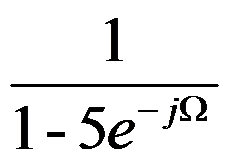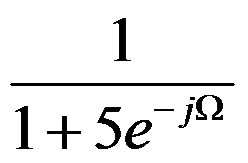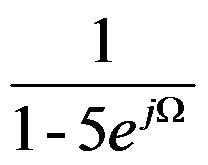 的DTFT为( )
的DTFT为( )A: 不存在
B:

C:

D:

举一反三
- 已知 f (t),为求<img src="https://image.zhihuishu.com/zhs/doctrans/docx2html/202101/1fb776d0006a4eb2b93e07afcad58896.png" />则下列运算正确的是(其中<img src="https://image.zhihuishu.com/zhs/doctrans/docx2html/202101/ada31d4207fe47d4908574b0a478486b.png" />, a 为正数)( ) A: <img src="https://image.zhihuishu.com/zhs/doctrans/docx2html/202101/fb0a09472a6b4408b3e833c2568308db.png" />左移<img src="https://image.zhihuishu.com/zhs/doctrans/docx2html/202101/ada31d4207fe47d4908574b0a478486b.png" /> B: <img src="https://image.zhihuishu.com/zhs/doctrans/docx2html/202101/fb0a09472a6b4408b3e833c2568308db.png" />右移 C: <img src="https://image.zhihuishu.com/zhs/doctrans/docx2html/202101/06dbb96ce1044280b13167a33033e4c6.png" />左移<img src="https://image.zhihuishu.com/zhs/doctrans/docx2html/202101/ada31d4207fe47d4908574b0a478486b.png" /> D: <img src="https://image.zhihuishu.com/zhs/doctrans/docx2html/202101/06dbb96ce1044280b13167a33033e4c6.png" />右移
- 试求序列<img src="https://image.zhihuishu.com/zhs/doctrans/docx2html/202101/cb5683e4401b464bb94af075183c06d2.png" />的双边z变换及其收敛域( ) A: <img src="https://image.zhihuishu.com/zhs/doctrans/docx2html/202101/07475602a8b04ef18fe697ba033d87cc.png" /> B: <img src="https://image.zhihuishu.com/zhs/doctrans/docx2html/202101/9d0ea6592c7d45a28bb6dac86e53ca52.png" /> C: <img src="https://image.zhihuishu.com/zhs/doctrans/docx2html/202101/d594b5541bf8465d9eca5af4a3b38545.png" /> D: <img src="https://image.zhihuishu.com/zhs/doctrans/docx2html/202101/ddd3f7717f134d54a0e27eef90e3b930.png" />
- 已知<img src="https://image.zhihuishu.com/zhs/doctrans/docx2html/202101/0b6bd03a30394de5866eb04046000d07.png" />,<img src="https://image.zhihuishu.com/zhs/doctrans/docx2html/202101/aced01bc1bc24d49a068c754294b44e3.png" />,<img src="https://image.zhihuishu.com/zhs/doctrans/docx2html/202101/8872a86bb2a9457dace1176d21809909.png" />,用拉普拉斯变换法解微分方程<img src="https://image.zhihuishu.com/zhs/doctrans/docx2html/202101/8ae2532227474de1bbdb5326fb2a05ec.png" />的零输入响应和零状态响应为( )。 A: <img src="https://image.zhihuishu.com/zhs/doctrans/docx2html/202101/5dac342ceb7141799376d81642c7bd17.png" /> B: <img src="https://image.zhihuishu.com/zhs/doctrans/docx2html/202101/c6491375b34b48ea9e1aa1e3cfda2c51.png" /> C: <img src="https://image.zhihuishu.com/zhs/doctrans/docx2html/202101/12c8d30af4244ab89d52eb7203d6d3a7.png" /> D: <img src="https://image.zhihuishu.com/zhs/doctrans/docx2html/202101/72758b4605f24d69a235afc727a0b877.png" />
- 已知某系统的数学模型为<img src="https://image.zhihuishu.com/zhs/doctrans/docx2html/202101/36eb028cda9447468911e236a321722e.png" />,那么系统的沖激响应<img src="https://image.zhihuishu.com/zhs/doctrans/docx2html/202101/2a6ea359e85c408fbece93c2e81f6076.png" />为( )。 A: <img src="https://image.zhihuishu.com/zhs/doctrans/docx2html/202101/2c5c40b2c9f84205812addf9df60664b.png" /> B: <img src="https://image.zhihuishu.com/zhs/doctrans/docx2html/202101/d1350a891d364096858a5f83a7415ece.png" /> C: <img src="https://image.zhihuishu.com/zhs/doctrans/docx2html/202101/e1352972cbd24aacb663ce6ef7fc95fc.png" /> D: <img src="https://image.zhihuishu.com/zhs/doctrans/docx2html/202101/1c91057ec86848a1b761ccb26b3ed883.png" />
- 下列化合物存在顺反异构的是( )。 A: <img src="https://image.zhihuishu.com/zhs/doctrans/docx2html/202101/f14204f643814b84bf651ec9404a27d2.png" /> B: <img src="https://image.zhihuishu.com/zhs/doctrans/docx2html/202101/2960cc15743342ba8415b73975674596.png" /> C: <img src="https://image.zhihuishu.com/zhs/doctrans/docx2html/202101/f4313a484dbc4c14867fee1d1d3845d8.png" /> D: <img src="https://image.zhihuishu.com/zhs/doctrans/docx2html/202101/b848dd83a35c43d4acca3b558de80d36.png" />
内容
- 0
下列结构具有对称面的是( )。 A: <img src="https://image.zhihuishu.com/zhs/doctrans/docx2html/202101/67f372abc1e54070b6805d653dfb19a0.png" /> B: <img src="https://image.zhihuishu.com/zhs/doctrans/docx2html/202101/0e819dd6086b43dc821e450310bf3bdd.png" /> C: <img src="https://image.zhihuishu.com/zhs/doctrans/docx2html/202101/47aae3d232074cdfa8615b322c5fceb9.png" /> D: <img src="https://image.zhihuishu.com/zhs/doctrans/docx2html/202101/960811b669074305a30d03f0ab617e88.png" />
- 1
已知信号<img src="https://image.zhihuishu.com/zhs/doctrans/docx2html/202101/dd73dc4df2f24b0780af6a97fdf8a562.png" />的奈奎斯特角频率为<img src="https://image.zhihuishu.com/zhs/doctrans/docx2html/202101/a43212a9536a46ac8a20c6dc7d78906d.png" />,则信号<img src="https://image.zhihuishu.com/zhs/doctrans/docx2html/202101/1821f6e23ad74b4ca7d8fb212ee4dada.png" />的奈奎斯特角频率为( )。 A: <img src="https://image.zhihuishu.com/zhs/doctrans/docx2html/202101/9eb48130d0e24c1c8234e1de4c730c0f.png" /> B: <img src="https://image.zhihuishu.com/zhs/doctrans/docx2html/202101/db0c7b373ae04e0599630a5086233c04.png" /> C: <img src="https://image.zhihuishu.com/zhs/doctrans/docx2html/202101/353ea3d067db4076977d456717aa82d2.png" /> D: <img src="https://image.zhihuishu.com/zhs/doctrans/docx2html/202101/6d550ebc083244648d78d5b2c334dfce.png" />
- 2
将十进制数(234)D转换为十六进制数是( )。 A: <img src="https://image.zhihuishu.com/zhs/doctrans/docx2html/202101/69b9dd631b80467b82eeea2d29a90c64.png"> B: <img src="https://image.zhihuishu.com/zhs/doctrans/docx2html/202101/67d6a8a637db42c089e81a50f37d316d.png"> C: <img src="https://image.zhihuishu.com/zhs/doctrans/docx2html/202101/16de6d06b38c4edb965211cd843da8f9.png"> D: <img src="https://image.zhihuishu.com/zhs/doctrans/docx2html/202101/1a312b896c104791a18f78a351d6b51d.png">
- 3
下列分布函数性质的叙述中错误的是( ) A: <img src="https://image.zhihuishu.com/zhs/doctrans/docx2html/202101/aa7be662728549808e1e31a941f40586.png" />是右连续函数,即<img src="https://image.zhihuishu.com/zhs/doctrans/docx2html/202101/3d2dd341bbb34bc49c6c16a0648e73a0.png" />; B: 对任意一个实数<img src="https://image.zhihuishu.com/zhs/doctrans/docx2html/202101/6af90c1b0d1a4a2e9f52db02fba49eb3.png" />,都有<img src="https://image.zhihuishu.com/zhs/doctrans/docx2html/202101/76a52406d5984c29b26b56770cd45589.png" />. C: <img src="https://image.zhihuishu.com/zhs/doctrans/docx2html/202101/700eb5d94c754071b3fabc46105a97e5.png" />,<img src="https://image.zhihuishu.com/zhs/doctrans/docx2html/202101/15b2abeddbab4e798304b38ed7d0a073.png" />; D: <img src="https://image.zhihuishu.com/zhs/doctrans/docx2html/202101/25cc87b8d99c4475861371e994a4a857.png" />是<img src="https://image.zhihuishu.com/zhs/doctrans/docx2html/202101/b62c2e7b67af45a28d3b1d079dd4ffd0.png" />单调非减函数;
- 4
梅森公式的正确表达形式为( )。 A: <img src="https://image.zhihuishu.com/zhs/doctrans/docx2html/202101/32780db6b4c34c3597992c3b7abf0732.png" /> B: <img src="https://image.zhihuishu.com/zhs/doctrans/docx2html/202101/5cc2dc9acb204d79a246fd1b76b4a91b.png" /> C: <img src="https://image.zhihuishu.com/zhs/doctrans/docx2html/202101/bf8a7fc9338f4d19b481d8b3334c37f6.png" /> D: <img src="https://image.zhihuishu.com/zhs/doctrans/docx2html/202101/0ffb1fb6223642fe8d12dd5e1e663af5.png" />


